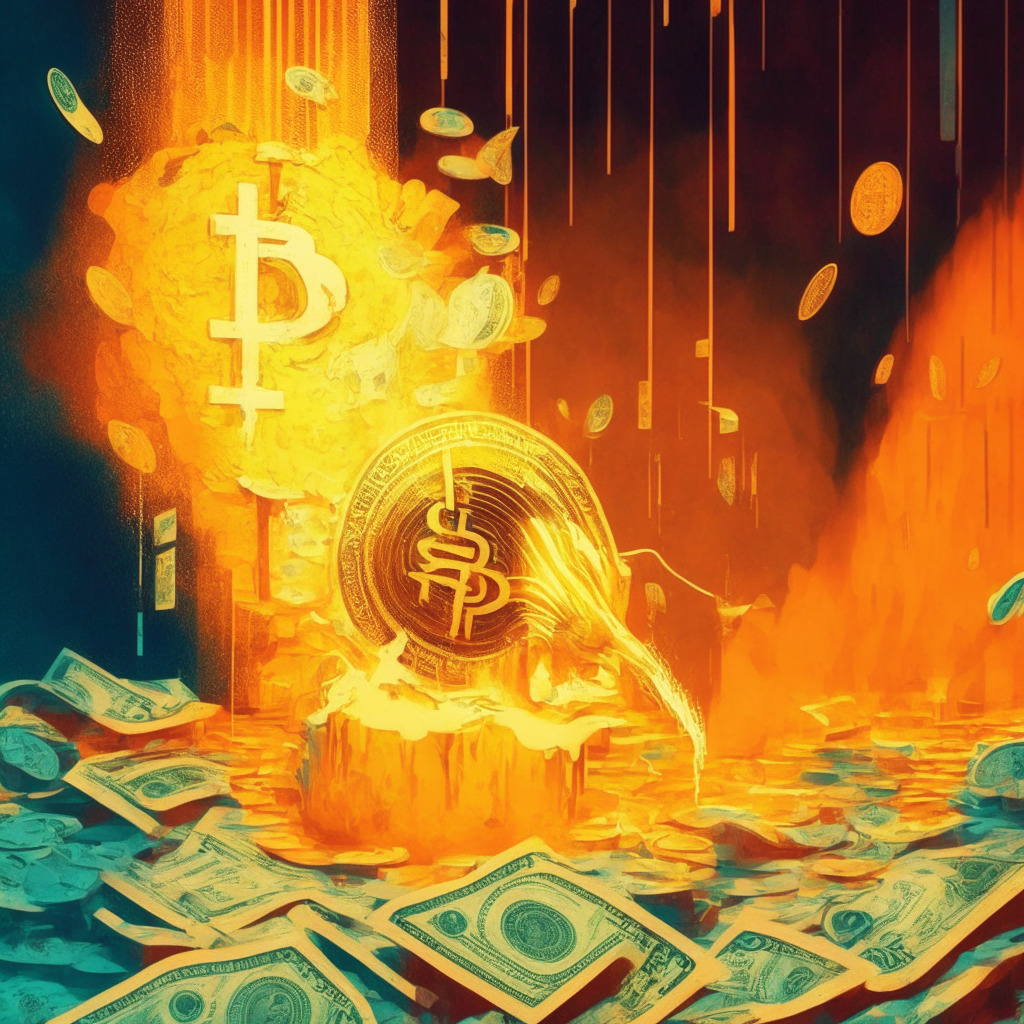Despite Canadian Prime Minister Justin Trudeau’s cautionary stance on digital assets, Bitcoin demonstrated a strong performance, outperforming inflation and the S&P 500 last year. Contrary to Trudeau’s viewpoint, several Liberal MPs, including Trudeau’s opposition rivals, own virtual asset investments, signaling a division in official perspective on crypto within his own party.
Search Results for: Markets in Crypto Assets
Asset Disposal Onslaught: Navigating the Imminent Crypto Gale and its Market Impact
“FTX is projected to sell around $3.4 billion worth of crypto assets by the end of 2023, contributing to potential market volatility. Altcoins may be particularly affected, with VC funds also becoming pivotal sellers. This increased volatility, however, may create investment opportunities for those bullish on blockchain’s future.”
Navigating the Crypto Storm: FTX Fallout, Market Turbulence & Hidden Opportunities
“The cryptocurrency market faced increased volatility following revelations from FTX, a bankrupt crypto exchange with significant holdings. These developments sparked fears of potential asset liquidation flooding the market. Despite this turbulence, select producers, such as Wall Street Memes, Kaspa, Monero, Bitcoin BSC, and Bitcoin Cash, continue to show promising technical outlooks and robust fundamentals.”
Understanding the Impact of Big Crypto Transfers during Market Downturns
Significant amounts of Bitcoin, Ethereum, and Arbitrum’s ARB token were recently moved to crypto exchanges by firms like Jump Trading, Wintermute, and Abraxas Capital amidst a market downturn. While such on-chain movements could signal intent to sell, they may also provide necessary liquidity between exchanges, as integral to market maker operations.
Dawn of the Altcoin Crash: FTX Liquidation and its Impact on Crypto Markets
“Cryptocurrency market volatility continues with Bitcoin experiencing a drop over 2%, Ethereum declining by 3.2%, and Solana’s SOL falling by over 8%. This descent is linked to potential liquidations of FTX’s $3.4 billion crypto assets, which may trigger an ‘altcoin crash”. While market turbulence creates investment opportunities, maintaining exposure to Bitcoin is advised amidst unstable altcoin conditions.”
Fear, Uncertainty, Doubt: Unexpected Catalysts for Crypto Price Rallies?
“Digital assets show potential for price rallies amid market uncertainty, reports cryptocurrency analytics firm Santiment. Increased Fear, Uncertainty, and Doubt (FUD) sentiments often lead to price boosts within cryptocurrencies. This trend witnessed Ethereum’s price rise 48% following a FUD incident.”
Riding the Crypto Storm: The Tale of Maple Finance, DeFi and Risk Management
Late in 2021, Maple Finance introduced a digital lending protocol promising token-skeptical institutions a share of Alameda Research’s trading profits. However, the crypto downfall in 2022 caused a significant impact on Maple, highlighting the inherent vulnerability of the DeFi space and the need for stringent risk management practices.
Crypto Regulation Reforms: India’s Bold Stride for Blockchain Market Accountability
“India, a G20 summit member, is adopting robust regulations for cryptocurrencies instead of an outright ban. The proposed five-point crypto ordinance includes stricter Know Your Customer standards aligned with international anti-money laundering and FATCA regulations, real-time Proof-of-reserve audits, harmonised tax policy, and elevating crypto exchanges to authorised dealers.”
G20 Endorses Crypto Asset Reporting Framework: Global Regulation or Financial Straitjacket?
The G20 leaders unanimously endorsed the Crypto Asset Reporting Framework (CARF), aimed to counter tax evasion and misuse of digital assets. The goal is to set a global regulatory structure for cryptocurrencies and begin information interchange by 2027. The roadmap includes adopting FATF standards to actively counter money laundering and terrorism financing.
Quantitative Easing and Crypto Interaction: Economic Savior or Inflation Nightmare?
Quantitative easing (QE) increases money supply, which may lead investors to alternative stores of value like cryptocurrencies. While not directly impacted by QE, cryptocurrencies’ values can surge due to fiat currency devaluation and lower interest rates.
Coinbase’s Global Game Plan: Tapping into Foreign Markets Despite US Regulatory Tensions
Coinbase, a global digital asset exchange, plans to expand its operations into Canada, the UK, Australia, Brazil, Singapore, and the European Union, prioritizing these markets due to more progressive digital asset regulations. This decision came after acknowledging restrictive regulations in the US market as a significant impediment. Key strategies for expansion include partnering with banks, payment service providers, and increasing local community engagement.
South Korea’s Mirae Asset Securities Collabs with Polygon Labs to Tokenize Assets: Will this Disrupt the Traditional Financial Landscape?
Mirae Asset Securities collaborates with Polygon Labs to facilitate tokenization and Web3 integration with traditional finance. This alliance aims to create an infrastructure for issuing and transacting tokenized securities – translating tangible assets into blockchain-backed cryptographic tokens. The partnership anticipates reshaping capital markets by eliminating intermediaries, promising a more efficient, transparent, and inclusive global financial system.
Unveiling the Dark Side of Crypto: The MTI Case, Regulatory Challenges and Forward Steps
“CFTC imposed a $1.7 billion fine on Mirror Trading International for fraud, revealing systemic issues plaguing the crypto space. The case emphasizes the necessity for change and serves as a reminder for investors to be wary of potential fraud, misconduct, and market manipulation.”
IMF and FSB’s Joint Synthesis Paper Revealed: New Approach to Crypto Regulations for G20 Summit
The joint synthesis paper from the International Monetary Fund and the Financial Stability Board discusses the challenges of implementing a total ban on crypto activities. Instead, it recommends targeted limitations and emphasizes the need for robust regulatory scrutiny. The paper also advises caution against granting crypto legal tender status, calls attention to potential risks associated with stablecoins and DeFi, and highlights possible macro-financial risks in emerging markets.
DeFi Giants Fined by CFTC: A New Era of Crypto Regulation or a Setback for Financial Innovation?
“The Commodity Futures Trading Commission (CFTC) has charged DeFi players Opyn, Inc., ZeroEx (0x), Inc., and Deridex, Inc. with illegal derivatives trading via blockchain-based protocols and smart contracts. The shift indicates that regulations are catching up in the crypto industry, particularly for DeFi platforms.”
Navigating Regulatory Hurdles: CFTC Member Advocates for Cryptocurrency Pilot Program
CFTC’s Caroline Pham advocates for a pilot program to oversee cryptocurrencies, aiming to stimulate the growth of digital asset markets. Besides facing resistance from current CFTC leadership, the crypto industry’s future is uncertain due to regulatory skepticism and Congress bills’ fate.
Exploring Crypto Facilities Potential in Reviving the Crypto Derivative Market after FTX’s Collapse
Crypto Facilities, associated with the crypto exchange Kraken, is planning to expand its diversity of client asset custody services but it requires expansion of its multilateral trading license. CEO Mark Jennings projects it may take six to twelve months for such implementation.
Bitcoin on the Brink: Will the Crypto Giant Master the Stormy Seas of Market Volatility?
“In the stormy seas of cryptomarkets, Bitcoin’s stability is being questioned as it hovers around a crucial value. Amid less volatility and ongoing discussions about the impact of the U.S.’s first Bitcoin spot price ETF, there’s divided opinion about the future of Bitcoin and other cryptocurrencies. Will Bitcoin bounce back or plummet? Only time will tell.”
Digital Riches: Analyzing Crypto Wealth Distribution, Market Dynamics and Regulatory Impact
Cryptocurrency has created 22 billionaires and 88,000 millionaires, six of whom have accrued their wealth from Bitcoin. A notable 182 individuals own over $100 million in crypto assets. The figures are based on high-net-worth individuals’ data and crypto exchange information. Crypto is trusted globally, with approximately 425 million people owning cryptocurrencies. However, the crypto markets are vulnerable to dips, recently erasing $2 trillion in value, influenced by SEC’s legal enforcement against Binance and Coinbase. While promising, crypto investing entails significant risk.
Crypto Market in Slumber: Spot Trading Hits Historic Low VS Evolution of Tokenization & ETFs
“Crypto spot trading hits its lowest point since March 2019, with a 7.78% slump in volume on centralised exchanges. Tokenization in finance is emerging from South Korea, aiming to enhance transaction efficiency and transparency. However, with a decrease in worldwide search queries for “cryptocurrency”, there is a shrinking general interest in digital assets, potentially forecasting a bearish market trend.”
Asset Managers Unfazed by Volatile Cryptocurrency Markets: Survey Reveals Bold Predictions
Despite the uncertain regulatory environment and sluggish cryptocurrency markets, nearly 50% of American and European asset managers surveyed by Coalition Greenwich and Amberdata are active in digital assets. The survey reveals optimism in the industry’s future, with 40% expecting 11% annual growth and 25% of firms having a distinct digital assets strategy. Potential opportunities are seen in ETFs, tokenized securities, and centralized exchanges.
New FASB Standards Redefine Corporate Cryptocurrency Adoption: A Boon or a Bane?
“The Financial Accounting Standards Board (FASB) in the U.S. greenlit new standards requiring firms to apply a fair-value approach to certain cryptocurrencies. These standards promise more transparency for investors and could potentially facilitate broader corporate cryptocurrency adoption despite potential earnings volatility for businesses with substantial crypto assets.”
OpenSea Insider Trading Case and Australia’s Crypto Bill: A Tale of Two Regulatory Challenges
“The crypto world brings to light the importance of regulation. Nathaniel Chastain’s conviction for wire fraud and money laundering at OpenSea exposes the need for internal checks in crypto platforms, while Australia’s debate over a Digital Assets Regulation bill underscores the importance of legislative solutions for this nascent industry.”
Australia’s Crypto Regulation Standoff: Balancing Market Protection and Innovation
The rejection of the Digital Assets (Market Regulation) Bill in Australia could potentially render the market vulnerable, leading to decreased consumer protection. Despite criticism, the event has triggered industry feedback and could shape future, effective crypto regulations, balancing consumer protection and innovation.
Unmasking the Impact of FASB’s Proposed Accounting Rule for Cryptocurrency
The Financial Accounting Standards Board (FASB) is proposing the first U.S. specific accounting rule for cryptocurrency, endorsing a fair-value approach for measuring digital assets. This could lead to wider crypto adoption, requiring businesses to report crypto dealings in quarterly income statements, promoting increased visibility and scrutiny. However, it’s uncertain if this will accelerate or slow corporate crypto adoption.
Evaluate Onchain Summer’s Impact and Jefferson’s Appointment on Crypto Market Future
‘Onchain Summer,’ an event promoting Base, Ethereum’s layer-2, saw 700,000 NFTs minted by over 268,000 users. Over $242 million in crypto assets were transferred to Base whilst facing challenges like network outages and scams. Philip Jefferson’s appointment as Federal Reserve vice chair signals potential advancements and uncertainties for the crypto sector.
Blockchain Boom: Story Protocol’s IP Ownership vs. Coinbase’s Crypto Lending Battle
“Story Protocol is using blockchain technology to empower content creators and oversee their content, countering falsified AI-generated content. Meanwhile, Coinbase has launched an institutional-grade crypto lending platform, Coinbase Prime. These high-value projects symbolize the maturing crypto technology space.”
The Paradox of Rate Hikes: Federal Reserve Tactics, BitMEX Perspective and the Emergence of the AI-Crypto Ecosystem
In a keynote at Korea Blockchain Week, Arthur Hayes, the founder of BitMEX, argued that Federal Reserve’s tactics to combat inflation could inadvertently fuel economic growth. He also predicted the potential of AI companies and a significant asset bubble resulting from the convergence of AI, crypto, and money printing.
Global Cryptocurrency Regulations: A Joint Venture by the FSB and IMF- Taking Crypto Mainstream
“The Financial Stability Board (FSB) and the International Monetary Fund (IMF) are working to align global cryptocurrency regulations. The move, prompted by India, aims at addressing the risks associated with cryptocurrencies, and includes potential macrofinancial risks to both developed and emerging markets.”
Crossing Borders: Crypto Regulation Varies from U.S Celebrities to Chinese Property Laws
“Cryptocurrency regulation is emerging as an international focal point, highlighting distinct differences between jurisdictions. While China’s court recognizes crypto as property, South Korea targets North Korean digital assets. Meanwhile, the London Stock Exchange and OKX embark on blockchain ventures, and MoonPay adapts to UK regulations.”
Overhauling Australia’s Crypto Bill: Innovation Boon or Investment Bane?
The Australian Senate has delayed Senator Andrew Bragg’s Digital Assets Bill for amendments, including the exclusion of certain tokens. While these modifications might shape a clearer regulatory framework, concerns arise about potential negative impacts on Australia’s crypto industry, including stifling innovation and deterring investors.
Grayscale’s Milestone Victory: Paving the Way for Crypto ETFs and the Challenges Ahead
“The asset management industry could see massive commercial breakthroughs in an expanding crypto class, thanks to recent legal victories like Grayscale’s. However, establishing clear regulatory frameworks is crucial for investor safety and market stability. As we experience a shift from retail to institutional capital flow, the dynamics of the crypto market may change.”































